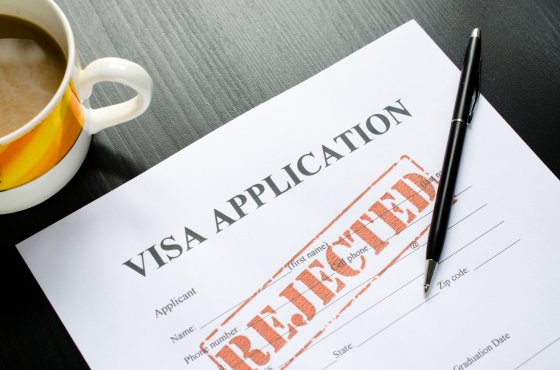‘Green card’ victims: how to find protection from abusive husband and avoid being deported
They fear their husbands, deportation, and police. Some of them do not want their relatives back home to learn about their situation. They are also scared of being judged, like “She wanted to stay in the U.S. so much that she married an abuser and now moans about it.” It’s the saddest moment of all stories featuring female immigrants eating dust for the sake of a coveted ‘green card.’

Фото Depositphotos
On any online forum for Russian-speaking American women, the top messages will be anonymous cries for help from wives depending on their abusive husbands. The scope of abuses is broad; it includes isolation, verbal harassment, and threats with bullying.
These women cannot help themselves: newly arrived wives often have no opportunities to make a living as they wait for obtaining a legal status in the U.S. Eventually, they might get help from attorneys, human rights organizations; they will get sheltered and assisted with clothes and lost documents. But they will have no place to hide from condemnation coming from their former compatriots.
But the key point is that they either are not aware of or do not believe that they can obtain an immigration status and a ‘green card’ without their abusive husband through VAWA — Violence Against Women Act. This Act allows applying for a ‘green card’ for female foreigners married to U.S. citizens or ‘green card’ holders who subject them to domestic violence.
“He hasn’t hit me yet…”
Blond and tiny Irina P. resides in Brooklyn with her little daughter. She is a real beauty with melodic voice and philosophic attitude.
“Well, now I can speak about this easily,” she smiles. “But it took me two years to recover.”
In February 2017 Irina together with her attorney applied for legal status. They grounded the application for ‘green card’ on violence she underwent in her marriage. Irina hasn’t received the documents yet, but she’s waiting in faith.
“I came here eight and a half years ago with J1 visa and got involved in a stupid relationship,” she says. “I gave birth to my daughter soon, and was left alone with her soon as well… After some time, I met Yevgeny. He is a naturalized American, divorced, has a disabled child from his first marriage. We started dating, and then moved in together. We rented an apartment jointly. Our relationship was not stable, but I am that Russian woman that would keep justifying everything. He would drive me crazy, and then he would come with flowers and I would forgive him everything. He proposed to me, and we got married on Nov. 23, 2015. After one month, on Christmas, he left me for his wife after a scandal.”
“Did he say anything?”
“No, but he called our attorney who had prepared all the documents by then. Yevgeny just had to sign them, but he said he would not sign anything. He was afraid I would apply for a ‘green card’ based on abuse. He started threatening me that he would deport me if I try to harm him anyway… I had no such intentions; all I wanted was to leave and find a place for me and my daughter. In February we signed a document on separation.
“By that time he had taken away everything he gave me, including a tablet for the child. At some point I broke down and piled all his presents in a corner, everything including underwear.
“I also spoke with two different attorneys as I could not believe that I can obtain any documents and that this was actually an abuse. He never hit me; hi did threaten me, but never hit me. And I thought the attorneys were lying to me in order to get my money.”
“This is why you applied for a ‘green card’ only a year after?”
“I wasn’t going to apply for it anyway. But Yevgeny was listed in my child’s school account because we used to live together for a while. After he left, I came to the school and updated the information — do not give my child to this man! One day my daughter got sick and missed the school, then for a second day… The teacher was not able to contact me, so she called him. He told her I was a bad mother and he wanted to see the principal. So this man, who has nothing to do with my kid, went to school and met the teacher and the principal. And then he said he would take the child away from me because I am a bad mother, and this would be for the benefit of the girl.
“This happened in May 2016, and that’s when I bristled and went to court to ask for an order of protect. He got scared and came with his attorney. We had a long litigation; in addition, I was still searching for a place to live and for my husband’s documents. He took away everything, including a marriage certificate, so I had to break into a desk and secretly make some copies.
“I filed my ‘green card’ application in February this year. A bit earlier, my husband sent a letter to the immigration authority penned by his attorney that I was a liar and have no right to obtain the documents as there was no abuse. Today, I’m just happy to not see him, as at first he used to live in both places. He would come to our apartment and say: “You’re officially my wife! You will have sex with me if I want to!” God is my witness, I didn’t want him to suffer in this situation, he just forced me.”

Фото: Depositphotos
A piece of advice by an attorney: the victim should act
“There will be no consequences for a husband in this situation!” says Yulia Nikolaeva, an attorney. The immigration service only decides on the immigration status of an abused spouse. A man can be a victim as well.
All you need to do is prove that you were married to a U.S. citizen or a ‘green card’ owner, that this was an official marriage, and that you were physically or emotionally abused.
There is no need for the other spouse to participate in this process. The decision is made based on information and documents provided by the victim. The rest is left to police if the abused spouse contacts the police.
No, you won’t be deported!
Immigrant females should know: the threats by their husbands – U.S. citizens that they will deport them or deny sponsorship are just a type of emotional abuse and a reason to apply for a ‘green card’ through VAWA.
VAWA is not about physical violence only. Any kind of emotional abuse — like offence, leaving without money, limitation of freedom, forcing to sex — is a reason to apply for a ‘green card’ based on VAWA.
VAWA stands for Violence Against Women Act. This Act was adopted more than two decades ago; it was drafted with support of Sen. Joe Biden and allows filing for a ‘green card’ for foreigners who are married to a U.S. citizen or a ‘green card’ holder and are being subjected to domestic violence. The Act is quite friendly — even if you got divorced or your American spouse died, you are entitled to apply during two subsequent years after the divorce or death. More on VAWA filing for a ‘green card’ can be found here.
“Something’s wrong with ME…”
Svetlana is another young and beautiful woman raising a child from her first relationship and having an American husband who decided to teach her a lesson.
“I fell in love with a young man who lived in the same apartment building. I used to reside with my mom in a small town in Russian Volga region. Too many women, too few men. Vadim was always in the center of women’s attention. I meant nothing for him, just nobody. And then he left for America. Some time later he found me in Odnoklassniki social media, asked me to come, promised to love me, to have kids together, to own a home with a lawn… I do not remember how I borrowed the money and obtained my tourist visa — it was like in a dream. I flew to New York awing.”
Only three months into living together Svetlana learned occasionally that Vadim stayed in the U.S. with a tourist visa, and he had no means to make legal documents for Svetlana. As well as for himself…
“A week after that, I found out I was pregnant. I cried and didn’t know what to do. My mom was terrorized by the people who gave me the money, and she could not pay back — we reside in the Volga region, and salaries are low there. My mom was crying and telling me not to come back!”
Svetlana and Vadim’s son was born as due and a copy of his dad. This still didn’t keep Vadim in the family — he left when the boy was three months old.
“I am so happy for two things that I did,” says Svetlana. “I didn’t go back. I would struggle there alone with my child. And I didn’t marry Vadim. He asked me to marry him but I said I would only marry a man with a legal status. After that Vadim left and we never saw him again. He never paid any child support and he does not reveal that he has a son. We never spoke again, but I heard it from people who know him. They also say he’s still an illegal immigrant and is not able to change that.”
When her son turned three years old, Svetlana met Dmitry, a naturalized American who had lived more than 20 years in the U.S. Dmitry was divorced and had twin daughters with his first American wife.
“I felt sorry for him that his wife was a bitch — she got on his nerves during a divorce and demanded child support that poor Dmitry would have difficulties to pay! But Dmitry pecked me quietly, and now I realize he was testing the frames. My English, he said, was poor, and I didn’t have a sense of the language, otherwise I would have learnt it by then. And my body shape is male type, he said, with wide top and narrow bottom. And his daughters, he said, did not want to see me, although they are so sociable! I didn’t see his daughters much as he could not win them through court. And my son was stupid, he said, just like me. I took it as criticism and thought he just wanted to make us better, to benefit us. I worked really hard — took English classes, studied at home, was buying presents for his daughters although it was very expensive for me — I earned mere cents, and we weren’t even married. I wanted him to marry me, but not because of the documents — I thought I fell in love with him. In fact, I just got emotionally stuck. Eventually, we did marry.
“At our wedding, he announced he married me out of pity, and I just made a joke of it. Then he refused to sign the documents for another two months. When I asked him about it again, he beat me up and kept telling me I was doing it for the documents, and if I love him I would live without them just like I had done before.”
“Why didn’t you go to police right after it?”
“I thought it was my fault because something was wrong with me… He never hit his first wife, he wouldn’t even dare. But I didn’t realize back then that the butcher senses his victim. He then came home in the evening with flowers and chocolates, and he swore he would never ever do it again, and that he just thought I didn’t need him… And I forgave him. He signed the documents right after it, he paid for it, and we sent them. He attacked me the second time was when I was about to be fingerprinted. I yelled at him — ‘I’m being fingerprinted tomorrow!’ — and he got scared and let me go. I decided that as soon as I obtain my ‘green card,’ I will leave him. I did not know I shouldn’t have waited… I also thought: he was a U.S. citizen, and who was I? How will I prove that he had hit me? We had been a perfect couple in the eyes of our neighbors. And I believed that I shouldn’t air my dirty laundry.”
Svetlana is currently living with her son in a shelter. She has received the documents but didn’t go to police regarding her ex-husband in order to save him from troubles.

Фото: Depositphotos
A piece of advice from an attorney: report to police
If you fell victim to physical abuse, report it to police immediately. Domestic violence is a serious and punished crime. ‘Green card’ holders might even lose their resident status and be deported home for committing it.
Who he is and who am I…
My notebook is full with such stories, just like my Facebook messenger and phone. Arguments and fears of the victims are pretty much the same, and usually it all comes down to ‘who he is! (a legal U.S. citizen) and who am I’ — a tourist, an illegal immigrant, a J-1-er… the one to wipe the floor with, to beat, humiliate, rape… The women do not know about their rights, they seem to have no desire to know them. When you listen to their stories, you feel like screaming.
“I feel like screaming as well,” a casual acquaintance of mine, Alina, says. We met through Facebook when we both commented on another anonymous cry for help like “Save me, I’m being abused!”
Alina is a volunteer who helps these women; but she does not want to show her face in order not to scare those she has helped and may help:
“From my experience, women do not report to police for three reasons: they don’t speak the language, have no money to pay attorneys’ fees, and they are being blackmailed by their husbands. It’s an immigration kind of blackmailing. Like ‘I will report on you, and you will be kicked out of the country in 24 hours!’ However, over the past several years the trend has changed. Now more husbands act as follows: as soon as they realize their wives might report to police, they lie low, and then all of a sudden they report to police first. Their reports, as a rule, are just made up.
“A close acquaintance of mine was hospitalized with a stress when her husband came home with police. He told the cops she was going to poison him with penicillin, to which he was allergic. They never had this medicine in their house anyway. She later asked her husband: “What if the cops asked you where I could buy that penicillin without a prescription, what would you say?” He said: “I would say that you Russians have no problems with that. You can go to a Russian neighborhood, and they will sell you without a prescription. You think you’re the smart one? If you talk nonsense, I’ll get you into jail!” By the way, he was indeed allergic to penicillin. As a result, she now lives in panic that he will accuse her of an attempt against him. She’s having a brain-fag all the time. She has no money to pay attorney’s fees, but that’s half a misfortune. I gave her phone numbers of social security services for domestic violence victims in her region. But she’s so scared she will be deported that she hasn’t called them. She lives where she’s able to. I have no idea how to help her. I tell her: ‘Natasha, please, let’s go to a shelter!’ And she keeps repeating: ‘He’s a U.S. citizen, and I’m nobody!’ I think this issue should be raised at the federal level all the time, as it’s persisted over so many years!
Free assistance
Although state officials and human rights activists have done so much to protect women, many of those abused still do not know how to receive professional assistance.
Any time any day, you call dial the National Domestic Violence Hotline at 1-800-799-7233 or 1-800-787-3224.They can help you through a Russian-speaking translator and possess information on special centers and shelters. They will also tell you about health, legal, and other assistance available to you. The same information is available on the hotline’s website.
In New York, you can dial 1-800-621-HOPE hotline. It operates 24h, just like many similar services, and has officers speaking 10 different languages, including Russian.
In New York you can get free assistance in Domestic Shelters organization that provides addresses of shelters, psychologist’s assistance, and useful articles about what exactly is deemed an act of abuse, scary statistics, and much more.
Safe Horizon is another nonprofit providing assistance to abuse victims in New York. Since 1978, it has helped thousands of the Big Apple residents who ended up in a complicated marriage situation.
Online polls indicate that only 7% of females know about shelters, social workers, psychologists and attorneys offered by the municipal authorities. The rest dial 911 in case of a tragedy. Or they don’t call anyone. Still, several centers for protection and support of women operate in different areas of New York City:
Family Justice Center (Bronx Office): 198 East 161th Street, Bronx, NY 10451. Subway: 4, B or D to 161st Street Yankee Stadium station. Buses: BX1, BX2, BX6 and BX13.
Brooklyn Family Justice Center: 350 Jay Street, Brooklyn, NY 11201 Subway: A, C, F or R to Jay Street or 2, 3, 4 or 5 to Borough Hall. Buses: B25, B26, B38, B51, B54, B57, B61, B65, B67 and B75.
NYC Family Justice Center in Manhattan: 80 Centre Street, New York, NY 10013 Subway: 4, 5 or 6 to Brooklyn Bridge-City Hall Station, J or Z to Chambers Street, N or R to City Hall, 1, 2 or 3 to Chambers Street, or A or C to Chambers Street. Buses: M5, M9, M22 and M103.
Family Justice Center in Queens: 126-02 82nd Avenue, Kew Gardens, NY 11415 Subway: E or F to Kew Gardens-Union Turnpike. Buses: Q10, Q37, Q46 and Q60.
Victims residing on Staten Island should call 311, the response team for domestic violence, for information and recommendations.
The centers operate Mo-Fri, 9 a.m. through 5 p.m. To reach for the nearest center, dial 311.
Family Justice Center will advise you in a case if you need to leave your home immediately.
In that case, have the following important documents for you and your children:
- Passports, ‘green cards,’ labor permits
- Social security cards, birth certificates
- Bank account statements, credit cards, check books
- Income statements, receipts
- Deed to the house, lease agreement
- Protective order
- Rulings on custody and visitation
- Marriage certificate
- Immunization and school records for kids
- Address book and prepaid cell phone
- A picture of the abuser
- Documents confirming the acts of violence, including emails, text messages, and diary entries
Pack a bag with cash, extra keys, clothes, drugs, and the above important documents, and keep the bag in a secure place or with people you trust.
Phrases you need to know when asking for help:
- spousal abuse — unequal and offensive relationship built on one spouse’s domination above the other;
- abuse — physical offense and threats;
- neglect — failure to provide food, clothes, shelter, hygiene items, and healthcare for a dependent person;
- domestic violence — abuse within marriage or family.
National Sexual Assault Telephone Hotline of the Rape, Abuse, Incest National Network (RAINN) — 1-800-656-HOPE (1-800-656-4673)
National Center for Missing and Exploited Children — 1-800-THE-LOST (1-800-843-5678) www.missingkids.com
National Center for Victims of Crime — 1-800-FYI-CALL (1-800-394-2255) 1-800-211-7996 (TTY/TDD)
The key task of these organizations is to provide security and safety.
Along with domestic violence, other forms of exploitation may occur, including human trafficking, when exploitation involves forced labor, services, or paid-for sex. Dial the following number for assistance regarding human trafficking issues:
National Human Trafficking Hotline — 1-888-373-7888 (24/7).
Attorney: “If you’re marriage is legal, you’re protected by the law”
Attorney Yulia Nikolaeva has been posting about problematic relationships on her Facebook page for a while. She calls on women to not be afraid and report to police and attorneys.
“I had an interesting case in my practice recently,” says Nikolaeva. “A girl was on a visit to the U.S. and met an attractive American. They had a passionate affair for several months. She was on a visit to her relatives, and returned home in Ukraine after it. Four months later, she came back to the U.S. on a bride’s visa. The girl had left behind a coveted career and well-off living; she brought $5,000 with her for the start. They got married, but soon after it the husband realized he was not ready ‘for this responsibility’ and kicked his wife out of his house, pocketing all her savings.
“We filed the documents and she received a ‘green card’ for 10 years,” Nikolaeva says. “Don’t be afraid. If your marriage is legal, you’re protected by the law.”
The attorney had put together her own list of recommendations for those involved in a toxic relationship, and the first piece of advice in this list is preventive:
- Try to avoid any kind of dependence: financial, physical and emotional self-sufficiency is a guarantee of not getting involved in such situations.
- If you got in such situation anyway, then a) don’t be afraid of anything; b) know your rights; c) act and protect your rights.
- Remember that no one has the right to abuse use IN ANY FORM, neither mental not physical. No one has the right to restraint your freedom, threaten or blackmail you. If this is happening, do not hope “it’s by accident,” “it will never happen again,” “this was for the last time.” The longer you drag it on, the worse situation will become, and the bigger emotional loss you will suffer when going out. You will have to go out of it, the ostrich tactics does not work here.
- If you were physically abused, report it to police immediately. Your abuser will be punished, not you.
- If violence is not obvious and takes a form of humiliation, personal restraint, financial restriction, forced sex or mental abuse, you might want to discuss it with your doctor or a gynecologist. They will refer you to experts who will help you cope with stress and get through the situation will minimum losses. In some cases they might report to police themselves or refer you to qualified organizations dealing with this issue and possessing all information on resources and options.
- Remember that you can always dial National Domestic Violence Hotline at 1-800-799-7233 or 1-800-787-3224. It possesses information on special centers and shelters for women and available medical, legal, and other support you can receive. For more information, visit the Hotline’s website.
Don’t be afraid. Love yourself, respect yourself, and do not allow others offend you. This country has tons of resources for protection of you and your kids. Believe in yourself, and act.
Читайте также на ForumDaily:
Splendor and destitution of Brighton Beach: life of legendary ‘Little Odesa’
Russian-speaking gays and lesbians start over in New York
Russian Alexey Rubin names New York City intersection after Sergei Dovlatov
To fake or not to fake: risk assessment of buying fake documents in the US
Two friends create toys to help fighting autism
Подписывайтесь на ForumDaily в Google NewsХотите больше важных и интересных новостей о жизни в США и иммиграции в Америку? — Поддержите нас донатом! А еще подписывайтесь на нашу страницу в Facebook. Выбирайте опцию «Приоритет в показе» — и читайте нас первыми. Кроме того, не забудьте оформить подписку на наш канал в Telegram и в Instagram— там много интересного. И присоединяйтесь к тысячам читателей ForumDaily New York — там вас ждет масса интересной и позитивной информации о жизни в мегаполисе.


















